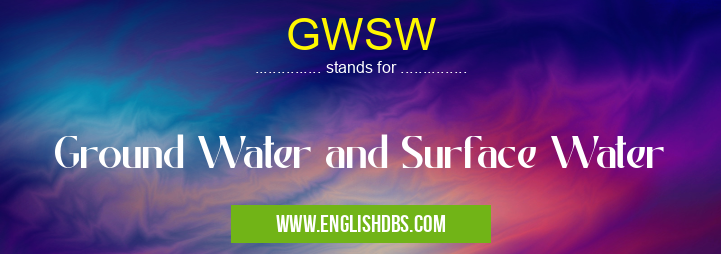What does GWSW mean in UNCLASSIFIED
GWSW (Ground Water and Surface Water) is a term used to describe the interrelatedness of groundwater and surface water, recognizing that they are not separate resources but are part of a single hydrologic system.

GWSW meaning in Unclassified in Miscellaneous
GWSW mostly used in an acronym Unclassified in Category Miscellaneous that means Ground Water and Surface Water
Shorthand: GWSW,
Full Form: Ground Water and Surface Water
For more information of "Ground Water and Surface Water", see the section below.
Meaning and Significance
GWSW emphasizes that:
- Groundwater originates from infiltration of surface water and is stored in aquifers beneath the ground.
- Surface water feeds groundwater through recharge processes and receives water from groundwater through discharge processes.
- Changes in one component of the system, such as groundwater extraction or surface water pollution, can impact the other component.
Full Form and Usage
- The full form of GWSW is Ground Water and Surface Water.
- It is commonly used in water resource management, hydrology, and environmental science.
- Understanding the GWSW relationship is crucial for:
- Sustainable water management
- Water quality protection
- Planning for climate change impacts
Essential Questions and Answers on Ground Water and Surface Water in "MISCELLANEOUS»UNFILED"
What is Ground Water and Surface Water (GWSW)?
GWSW encompasses all water resources found above and beneath the Earth's surface, including rivers, lakes, oceans, aquifers, and groundwater. These sources are vital for human consumption, agriculture, industry, and ecosystems.
How does groundwater differ from surface water?
Groundwater is water that exists beneath the Earth's surface, while surface water is found in rivers, lakes, and oceans. Groundwater typically flows slower than surface water and is less susceptible to contamination.
Why is GWSW important?
GWSW provides drinking water for over 2 billion people worldwide and supports various human activities. It also sustains aquatic ecosystems, regulates climate, and replenishes soil moisture.
What are the major threats to GWSW?
Over-extraction, pollution from industrial activities, agricultural runoff, and climate change pose significant threats to GWSW.
What can we do to protect GWSW?
Implementing water conservation measures, reducing pollution, protecting watersheds, and addressing climate change impacts are essential steps towards safeguarding GWSW.
How can I get involved in GWSW conservation?
Supporting organizations working to protect water resources, advocating for sustainable policies, and educating others about the importance of GWSW are ways to contribute to conservation efforts.
Final Words: GWSW highlights the interdependence of groundwater and surface water and underscores the need for holistic water management practices to ensure the availability and quality of water resources for present and future generations.
